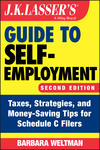Wage Base for Social Security Up in 2009
The largest increase in Social Security benefits since 1982 also means the largest hike in the wage base for Social Security taxes in 2009. The base will increase to $106,800 (up from $102,000 in 2008).
There is no wage base for Medicare taxes; all earnings are subject to this tax.
The tax rate for Social Security remains unchanged, at 7.65% for employees and employers. Self-employed individuals pay 15.3%, one half of which is deductible for income tax purposes. The tax rate for Medicare also remains unchanged at 1.45% for employees and employers (2.9% for self-employed individuals who can deduct one half of this tax as well).
Individuals who collect Social Security benefits before reaching the full retirement age are subject to a reduction (usually $1 for every $2 of excess earnings; $1 for every $3 of excess earnings in the year of attaining full retirement age). The earnings limit in 2009 rises to $1,180 per month (up from $1,130 per month in 2008). For those who attain full retirement age during the year, the earnings limit in 2009 is $3,140 per month (up from $3,010 per month in 2008).
Tax deferral
Shifting income to a later year, such as where you defer taxable interest to the following year by purchasing a T-bill or savings certificate maturing after the end of the current year. Investments in qualified retirement plans provide tax deferral.



